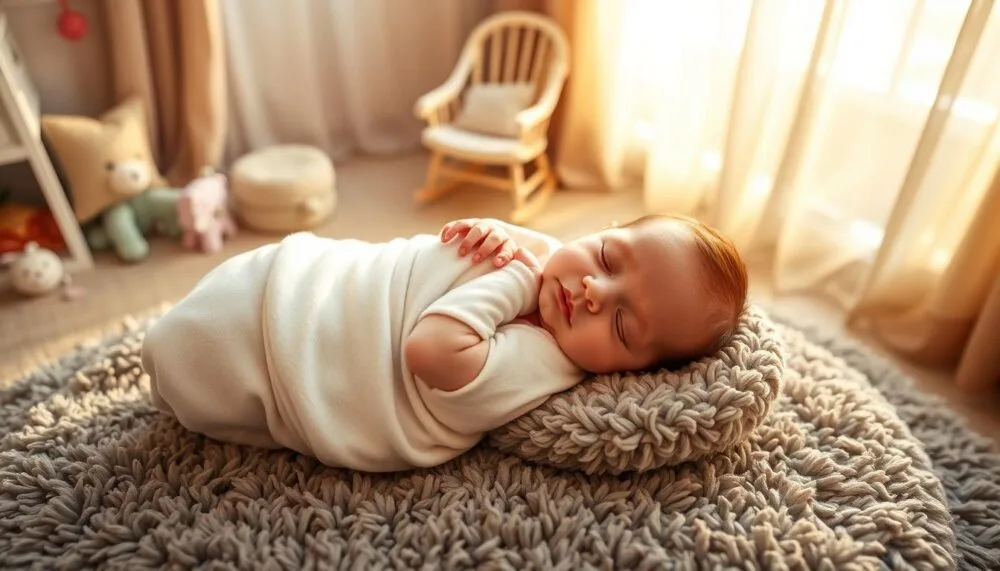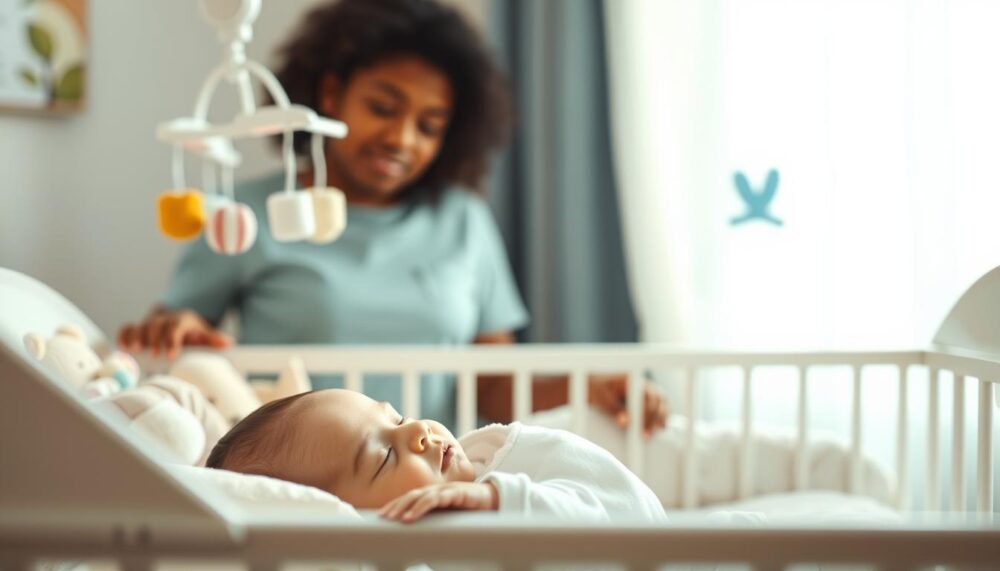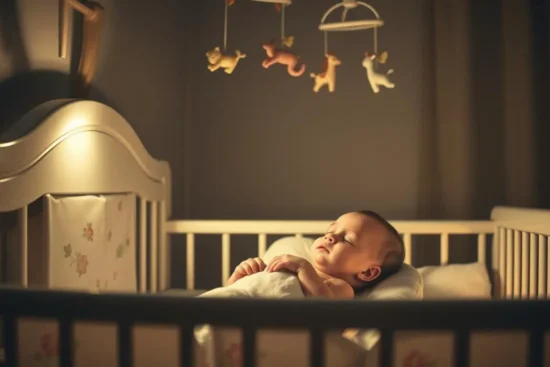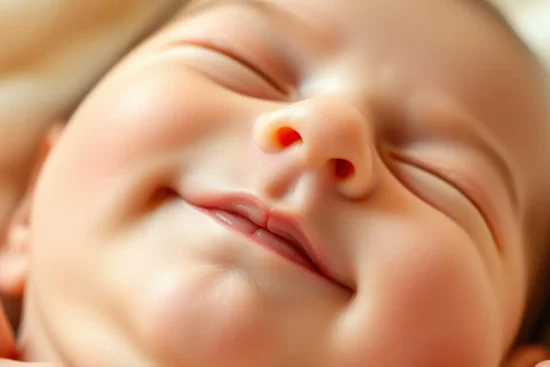
As a concerned parent, I often wonder how long my baby should sleep after vaccination. The answer depends on several things. These include the vaccine type, my baby’s age, and their sleep habits. I want to know how long to let my baby sleep to help them recover.
To figure out how long my baby should sleep after vaccinations, I need to think about how vaccines affect their sleep. Knowing this is key for my baby’s health and happiness. I’m searching for expert advice on the right sleep time after vaccinations.
Introduction to Baby Sleep and Vaccinations
Ensuring my baby gets the best sleep care is important to me. This includes knowing how long they should sleep after getting vaccinated. By understanding the link between vaccinations and sleep, I can help my baby recover and stay healthy.
Key Takeaways
- How long my baby should sleep after vaccinations depends on several factors, including the type of vaccine and my baby’s age.
- Understanding the potential effects of vaccinations on my baby’s sleep is crucial for their overall health and well-being.
- I should consider my baby’s individual sleep patterns when determining how long they should sleep after vaccinations.
- Expert advice can provide guidance on how long I should let my baby sleep after vaccinations.
- Supporting my baby’s recovery through rest is essential for their health and well-being.
- How long I should let my baby sleep after vaccinations is a critical question that requires careful consideration.
Understanding the Connection Between Vaccinations and Baby Sleep
As a parent, you might wonder how vaccines affect your baby’s sleep. The immune system’s reaction to the vaccine can make your baby sleepier or harder to fall asleep. It’s key to understand these changes to help your baby recover well. When looking at baby vaccination sleep duration, remember that every baby is different.
The link between vaccines and baby sleep is intricate. After a vaccine, your baby’s immune system fights off the vaccine, which can change their sleep. Some might sleep more, while others might find it hard to fall asleep or wake up often at night. The vaccine type, your baby’s health, and their sleep habits can all affect sleep duration after a vaccine.

To grasp how vaccines affect your baby’s sleep, keep these points in mind:
- Vaccines can make your baby sleepier because of the immune system’s work.
- Some babies might find it tough to fall asleep or wake up more at night.
- The vaccine type and your baby’s health can change how they sleep.
Knowing how vaccines can impact your baby’s sleep helps you support their recovery and healthy sleep. Watch your baby’s sleep duration and sleep patterns after a vaccine. This way, you can spot any changes and adjust to help them get enough rest.
How Long Should I Let My Baby Sleep After Vaccinations
As a parent, you might wonder how long your baby should sleep after getting vaccinated. The right infant nap time post vaccines varies based on your baby’s age and sleep needs. Babies under four months often need more naps, while older ones might sleep longer but less often.
To figure out the best sleep plan for your baby, think about these points:
- Age: Babies under four months often need more naps, while older babies sleep longer but less.
- Individual sleep needs: Watch your baby’s sleep patterns and adjust their nap schedule as needed.
- Vaccine type: Different vaccines can affect your baby’s sleep in different ways.
It’s key to keep an eye on your baby’s sleep and adjust their nap schedule as needed. This helps them rest well after vaccinations and stay healthy. Always talk to your pediatrician if you’re worried about your baby’s sleep or health.

Understanding your baby’s unique needs helps you adjust their infant nap time post vaccines for recovery and health. Always put your baby’s health first and talk to your pediatrician if you have concerns.
Common Side Effects That May Impact Your Baby’s Sleep
As a parent, knowing about vaccination side effects on your baby’s sleep is key. After shots, your baby might feel fever, pain, or get irritable. It’s important to understand these effects to care for your baby well.
Some common physical reactions that may impact your baby’s sleep include:
- Fever: a common side effect of vaccinations that can cause discomfort and restlessness
- Pain: injections can be painful, leading to fussiness and difficulty sleeping
- Irritability: vaccinations can cause irritability, making it challenging for your baby to settle down and sleep
Behavioral changes can also affect your baby’s sleep. These may include:
Behavioral Changes to Watch For
Changes in appetite, mood swings, and increased clinginess are common. These can impact your baby’s newborn rest after shots. It’s crucial to watch your baby’s behavior and adjust your care.
Knowing about these side effects helps you support your baby’s comfort and newborn rest after shots. This ensures they get the rest needed to recover from vaccinations.
Safe Sleep Practices Following Immunizations
As a parent, it’s crucial to follow best sleep practices for vaccinated baby after shots. A sleep-friendly environment is key. This means avoiding too much stimulation and keeping your baby safe while they sleep. Here are some helpful tips:
Some key considerations for best sleep practices for vaccinated baby include:
- Creating a dark, quiet sleep environment
- Maintaining a comfortable room temperature
- Avoiding overstimulation before bedtime
- Establishing a consistent sleep schedule
By following these guidelines, you can create a cozy space for your baby to rest and heal. Remember,
It’s also important to know your baby’s special needs and adjust your approach. By focusing on best sleep practices for vaccinated baby, you help your baby get better and grow strong.
| Tip | Description |
|---|---|
| Monitor temperature | Keep an eye on your baby’s temperature to ensure it’s within a safe range |
| Maintain hydration | Ensure your baby is well-hydrated to support their recovery |
| Watch for side effects | Be aware of potential side effects from vaccinations and seek medical attention if necessary |
Monitoring Your Baby’s Post-Vaccination Rest
As a parent, it’s key to watch your baby’s sleep after shots. Tips for infant vaccination sleep are very important. Babies might sleep differently after shots, and knowing what’s normal is crucial.
Knowing these signs helps you care for your baby better. Look out for increased sleepiness and changes in appetite. Also, know when to call the doctor, like if your baby has high fever or difficulty breathing.
Here are some important things to remember about your baby’s sleep after shots:
- Look for normal sleep signs, like more sleepiness and changes in eating
- Keep an eye on your baby’s temperature, as fever is common after shots
- Know when to call the doctor, like for high fever or trouble breathing
By following these tips and watching your baby’s sleep, you can help them recover safely. Always talk to your pediatrician if you’re worried about your baby’s sleep or health.
| Signs of Normal Sleep Behavior | When to Contact Your Pediatrician |
|---|---|
| Increased sleepiness, changes in appetite | High fever, difficulty breathing, vomiting |
| Restlessness, irritability | Refusal to feed, lethargy, rash |
Creating the Ideal Sleep Environment After Shots
As a parent, making your baby’s sleep area perfect after shots is key. The room should be dark, quiet, and just right for temperature. Baby immunization sleep guidelines suggest a firm mattress and snug sheets for safety. Use blackout curtains or shades for darkness and a white noise machine for quiet.
Here are more tips for the perfect sleep space:
- Keep the room at a comfortable temperature between 68-72°F (20-22°C)
- Use a humidifier to maintain a comfortable humidity level
- Avoid placing toys or objects in the crib that can pose a suffocation risk
By following these baby immunization sleep guidelines, your baby can sleep safely and comfortably after shots. Always put your baby’s safety and well-being first.
Setting up a regular sleep routine and a sleep-friendly area helps your baby get better after shots. It also helps them sleep well. Always talk to your pediatrician for advice on baby immunization sleep guidelines and sleep habits.
| Sleep Environment Factors | Recommendations |
|---|---|
| Room Temperature | 68-72°F (20-22°C) |
| Humidity Level | 40-60% |
| Lighting | Dark or dim red light |
Tips for Comforting Your Vaccinated Baby
After vaccinations, it’s key to make your baby’s environment comfy and soothing. Knowing how long should i let my baby sleep after vaccinations helps them rest well. Babies often sleep more after shots, so watch their baby vaccination sleep duration closely.
To soothe your baby, try rocking them gently, swaddling, or using white noise. These can calm them and help them sleep better. Also, check for any pain or distress during sleep and try to make them feel better.
Here are some tips for better sleep:
- Make their sleep area dark and quiet.
- Stick to a regular sleep schedule.
- Keep them calm before bedtime.
By doing these things, you can help your baby rest well after vaccinations. This supports their health and happiness.
Special Considerations for Different Vaccine Types
As a parent, knowing how vaccines affect your baby’s sleep is key. Different vaccines can change your baby’s sleep patterns. For example, the DTaP vaccine may make your baby fussier and less calm.
To help your baby recover, try these tips:
- Watch your baby’s temperature, as some vaccines can cause a low-grade fever. This might affect their sleep.
- Use soothing methods like swaddling or white noise to help your baby relax and sleep better.
- Keep a sleep diary to track any changes in your baby’s sleep after getting shots.
Remember, every baby is unique. What works for one might not work for another. By knowing how vaccines can affect sleep, you can support your baby’s recovery.
Conclusion: Supporting Your Baby’s Recovery Through Rest
Ensuring your baby gets enough rest is key for their health and happiness. Knowing how vaccinations affect sleep helps you create a cozy sleep space. This way, you support your baby’s recovery.
Keep an eye on your baby’s sleep after vaccinations. Look for normal signs and talk to your pediatrician if you’re worried. Using gentle techniques and easing any pain helps your baby sleep well.
It doesn’t matter if your baby had routine shots or a special vaccine. Making sure they rest is vital for a quick recovery. By following these sleep tips, your baby will feel better and more rested.
FAQ
How long should my baby sleep after vaccinations?
The right nap time for your baby after shots depends on their age and sleep needs. Babies under four months might need more naps. Older babies might sleep longer but less often. Watch your baby’s sleep and adjust their nap times as needed.
What are the common side effects that may impact my baby’s sleep after vaccinations?
Shots can cause side effects like fever, pain, or fussiness. Knowing these side effects helps you care for your baby better.
How can I create the ideal sleep environment for my baby after vaccinations?
A good sleep space is key for your baby’s recovery. Make sure the room is dark, quiet, and comfy. Use a firm mattress and sheets that fit tight.
What tips can I use to comfort my vaccinated baby?
Comforting your baby is vital for their recovery and sleep. Use soothing methods, manage any sleep discomfort, and encourage healthy sleep habits.
Are there any special considerations for different vaccine types?
Different vaccines can affect sleep differently. It’s important to know how to help your baby recover based on the vaccine they got.







